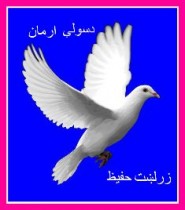By Hanan Habibzai STAFF WRITER
Two years ago when I was working in Afghanistan as a journalist, I was woken up by calls from across the country. The calls were from the ordinary Afghans sharing the events and news in their areas; almost always involving bloodshed. Although, at present, I am away from my motherland but the number of such contacts have doubled.
People keep enquiring about the possible outcomes of the current situation. They are anxiously waiting to know about the timeline for peace to return to Afghanistan. The increasing corruption, human rights violations and atrocities severely affect their hopes about the return of peace, if ever. These questions are from people who witnessed decades of war.
The similar questions for someone who viewed the good time of his country only through books but still, I am optimistic. The very fact that the ordinary Afghan is thinking of peace and stability gives me hope.

I have seen similar longing for peace during discussions with Afghans involved with poetry and arts.
“I am awaiting peace that is why my poetry is for peace” said, Zarlasht Hafeez, an Afghan poetess. Zarlasht is a conservative lady, she hides her age and pictures and is known to the audience only through her poetry:
The killing of the youth, the funerals are coming
Unfulfilled hopes of brides, the bloodshed is continuing
The foolishness of few selfish, the red flame is continuing
In competition for power, the darkness is growing
Widows are in graveyards with tears; my heart is restless
I wait for peace for the grief-stricken Pashtun
Ordinary Afghans are the main victims of war, giving the common man’s poetry a heart shattering voice. Continuing war and repeated destruction has given birth to many new poets, raising the call for peace across the entire nation.
The main question which has remained unanswered is that, what is the main reason that prevents peace and stability in Afghanistan?
It is clear that the misconduct by the state officials prevent peace from returning. The state corruption is a huge headache promoting threats to the national security. Corruption has been promoted by key government figures preventing the success of international plans.
I was surprised when Afghan Attorney General Ishaq Aleko appeared in a press conference in June and accused American Ambassador in Kabul interfering with the Attorney’s affairs. Later when I investigated the fact I obtained copies of two letters that Iranian ambassador Feda Hossein Maleki sent to Afghan Attorney General requesting the arrest of a journalist and an Afghan parliamentarian.
The letters called for the parliamentarian and the journalist to be punished under Afghan criminal code for suspicion of separatist and insulting actions. The letters warned the Afghan attorney that failure to take preventive action would have a negative influence on relations between the two countries.

TV reporter Fahim Kohdamani was one of them. He was released after four weeks of detention in Kabul and the insult charges are still pending against him. A letter proves that the arrest was the result of a complaint by the Iranian embassy.
It was shocking that an Afghan journalist was detained like a criminal because of a complaint by the Iranian Ambassador. Now, a question which remains unanswered is that whether Iranian Embassy has the authority to order Afghan prosecutors to arrest people and the American Embassy does not?
When the American Ambassador requested the arrest of a corrupt money exchanger, the Afghan Attorney General considered it as interference in his affairs. It is a very repentant case for Afghanistan that the head prosecutor of the country is involved in corruption. Can we still expect people to support the government?
It is not easy to convince ordinary Afghans that the government serves great values. Bribery is not a shame in the attorney’s office. The story of Essa Kharoti, an Afghan-British trader is proving the fact. He invested hundreds of thousands of dollars in his business.
In 2004 he took part in reconstruction process and launched crash producing factory in south of Kabul. A local commander was regularly disturbing his work and demanding a percentage in his factory. Essa went to the officials including Karzai himself to get support but, outside the presidential palace no one listened to the presidential orders.
He then went to attorney general’s office. His case was referred to the current attorney general Ishaq Aleko who demanded huge amount of money to calm dawn the commander. Essa refused his demands and was soon put in jail.
After forty days, a representative of attorney visited Essa in jail and asked him for US $ 40,000. Essa was tired of jail and unlawful official behavior and paid the amount to get out. He was forced to quit his project and was able to escape. Essa kharoti paid more bribe to a junior prosecutor to provide him a key document which proves the entire story.
A UN report released early this year put forward that in 2009, Afghan citizens had to pay approximately US$ 2.5 billion in bribes, which is equivalent to 23 per cent of the country’s gross domestic product (GDP. By coincidence, this is similar to the revenue accrued by the opium trade in 2009 (which UNODC estimates at US$ 2.8 billion).
Drugs and bribes are the two largest income generators in Afghanistan; together they correspond to about half the country’s (licit) GDP.
The report shows that graft is part of everyday life in Afghanistan. During the survey period, one Afghan out of two had to pay at least one kickback to a public official. In more than half the cases (56 per cent), the request for illicit payment was an explicit demand by the service provider.
In three quarters of the cases bribes were paid in cash. The average bribe is US$ 160, in a country where GDP per capita is a mere US$ 425 per year. Afghans are confronting the big challenges. The demands for fairness and justice remain unsuccessful. It was the big fact for Zarlasht Hafeez who raised a voice against unfairness:
If the governmental judge is a bribe taker
The corruption can be found in every corner of that country
It is the law that can only rule a country
The security can’t come by the vigour of thieves
Shapeerai Naghma is a great lady and a celebrity Afghan singer. For the past three decades she has been trying to bring a smile on the faces of the painful Afghans, through her melodic songs.
She was brought up in Kandahar, south of the country, and broke the rules of a traditional society to become a singer. Her songs are delivering the message of peace, unity and love. She has millions of fans across Afghanistan and Pakistan. She also raised a strong voice for Afghan women but corruption, atrocities, violence and injustice forced her to change the topic of her work. She called for resistance against the bribery and corruption:
Color my tattoos with your blood
Hey Afghan, awake and think about it
None of ordinary people are happy. Corruption, poverty, injustice and violence are usually portrayed as the biggest challenges confronting Afghanistan but the corruption is an immense reason for increasing the instability and pushing Afghans to charter their own path to their destiny.

Hanan Habibzai, an investigative journalist with more than ten years of experience in global journalism has covered the US invasion of Afghanistan, the fall of the Taliban regime, and post-Taliban developments, including the rise of militancy in the country.
MA in global journalism from Coventry University, Hanan writes on the conflict in Afghanistan and the regional politics, his work has been published by the BBC Afghan Stream, Pajhwok Afghan News, Reuter’s news agency, the Washington Post, Veterans Today, several local and the global media agencies, Including contribution in a journalism book Afghanistan War and the Media: Deadline and Frontline (2010), edited by R, Keeble & J, Mair, Hanan’s academic work is published around the world.
ATTENTION READERS
We See The World From All Sides and Want YOU To Be Fully InformedIn fact, intentional disinformation is a disgraceful scourge in media today. So to assuage any possible errant incorrect information posted herein, we strongly encourage you to seek corroboration from other non-VT sources before forming an educated opinion.
About VT - Policies & Disclosures - Comment Policy



